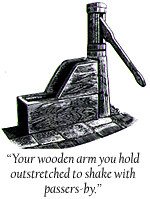Main Menu · Search · Current Issue · Contact · Archives · Centennial · Letters to the Editor · FAQs
![]()
Main Menu · Search · Current Issue · Contact · Archives · Centennial · Letters to the Editor · FAQs


![]()
Professor Otto R. Osseforp, first holder of Harvard's Emor D. Nilap chair of Palindrominology, was rescued from academic obscurity by Solomon W. Golomb, Ph.D. '57, whose interview with the Janus-faced scholar appeared in the Harvard Bulletin of March 1972. The interview has been reprinted from time to time, and has even been copied on the Internet. But Professor Osseforp, now emeritus, shuns publicity and has all but disappeared into the abstruse realms of theoretical reflexology. We are therefore indebted to Mark Saltveit '83, editor of The Palindromist magazine, for tracking down the reclusive professor and drawing him out on a topic of current interest to every loyal Harvardian.
"Mindful of the upcoming Harvard-Yale football game, I interviewed the esteemed professor at his senior citizens' residence," Saltveit writes. "Famous for his partisan Crimson pride, as well as for speaking in palindromes, this avid Harvard fan plans to attend the big game, his advancing years notwithstanding, and to lead his trademark cheers as he has for decades.
"I agreed in advance to limit my questions to this aspect of his current activity."
Professor Osseforp, tell me about this year's Yale squad.
"Name of Eli--vile foe, man."
You seem personally antagonized by Yale's team. What is it, sir, that bothers you most about them?
"Stare of Eli! Vile foe! Rats!
I see. Anything else?
"Eli bile."
Well, then, Professor, I've long heard of your passionate and distinctive chants. But some say your reputation as a cheerleader is overblown.
"No! I sired war! We nail Eli--a new, raw derision."
Do you really think the crowd makes a difference in The Game?
"Are we not bane of Eli? (Vile foe!) Nab, to new era!"
Okay. So please give us a couple of your trademark cheers.
"So many delays, Yale 'dynamos'!"
Ah yes, good use of sarcasm. Any cheers for the referees?
"No Eli pile on."
Fair enough. [Here the professor unscrewed the cap of his hollow cane and drained it. His competitive passion was clearly at full flood.] Do you have any comments about Yale's cheerleaders?
"Part-Eli bunnies, pale, lapse in nubile trap!"
Ahem. [The professor was becoming agitated. I motioned to his nurse.] Okay, then, Professor...
"Eli! Riveting in a wide-wale suit, I use law, Ed. I, wan, ignite--virile!"
Thanks for your time, Professor. I really have to be going...
"Rail, Marian! I defile docile Eli cod, Eli-fed, in air, am liar!"
"Though his passion may carry him away at times," concludes Saltveit, "the good professor remains an inspiration to Harvard fans everywhere. Go Crimson! No smircog!"
With support like that, how can our lads fail to win the big one?
We might note that Solomon Golomb, our first Osseforpian interlocutor, is professor of electrical engineering and mathematics at the University of Southern California; he invents brain-teasers as a sideline (see "The Final Oral Exam," Harvard Magazine, May-June 1980). Golomb will surely be glad to know that Osseforp perseveres in his arcane field and still cheers at The Game. He may even drive the same car (a Toyota), though never on one-way streets.
Semanticists: John A. Baruch '50, of Morristown, New Jersey, wants help. Consulting his American Heritage Dictionary of the American Language (1973 edition), Baruch happened to notice the compilers' third definition of anticlimax:
Rhetoric. a. A sudden descent from the impressive or significant to the ludicrous or inconsequential. b. An instance of this; for example, For God, for country, and for Yale.
Let the record show that Primus IV quoted that definition in the College Pump 0f March-April 1984. But Baruch adds: "With my curiosity aroused, I consulted a more recent work of reference, The Random House Dictionary of the English Language, Second Edition (1983), where I found the third meaning of anticlimax described in an updated version:
3. A noticeable or ludicrous descent from lofty ideas or expressions to banalities or commonplace remarks: We were amused by the anticlimax of the motto: "For God, for country, and for Acme Gasworks."
"The unresolved question," asks Baruch: "Which of the two examples of banality is the more ludicrous?"
The Pump awaits learned opinions, particularly from readers with institutional ties to Acme Gasworks.
~ Primus IV
Main Menu · Search · Current Issue · Contact · Archives · Centennial · Letters to the Editor · FAQs
![]()